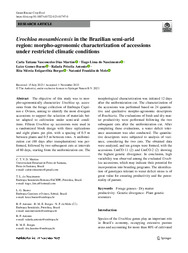Urochloa mosambicensis in the Brazilian semi?arid region: morpho?agronomic characterization of accessions under restricted climatic conditions.
Urochloa mosambicensis in the Brazilian semi?arid region: morpho?agronomic characterization of accessions under restricted climatic conditions.
Author(s): MARTINS, C. T. V. D.; NASCIMENTO, T. L. do; BUENO, L. G.; ANTONIO, R. P.; BORGES, R. M. E.; MELO, N. F. de
Summary: The objective of this study was to morpho-agronomically characterize Urochloa sp. accessions from the forage collection of Embrapa Caprinos e Ovinos, aiming to identify the most divergent accessions to support the selection of materials better adapted to cultivation under semi-arid conditions. Fifteen Urochloa sp. accessions were used in a randomized block design with three replications and eight plants per plot, with a spacing of 0.5 m between plants and 0.5 m between rows. A uniformization cut (60 days after transplantation) was performed, followed by two subsequent cuts at intervals of 60 days, starting from the uniformization cut. The morphological characterization was initiated 12 days after the uniformization cut. The characterization of the accessions was performed based on 24 quantitative and qualitative morpho-agronomic descriptors of Brachiaria. The evaluations of fresh and dry matter productivity were performed following the two subsequent cuts after the uniformization cut. After completing these evaluations, a water defcit tolerance assessment was also conducted. The quantitative descriptors were subjected to analysis of variance, considering the two cuts. The obtained data were analyzed, and ten groups were formed, with the accessions UmCO-11 (2) and UmCO-2 (2) showing the highest genetic divergence. In conclusion, high variability was observed among the evaluated Urochloa accessions, which may indicate their potential for incorporation into breeding programs. The identifcation of genotypes tolerant to water defcit stress is of great value for ensuring productivity and the perenniality of pasture.
Publication year: 2024
Types of publication: Journal article
Unit: Embrapa Semi-arid Region
Observation
Some of Embrapa's publications are published as ePub files. To read them, use or download one of the following free software options to your computer or mobile device. Android: Google Play Books; IOS: iBooks; Windows and Linux: Calibre.
Access other publications
Access the Agricultural Research Database (BDPA) to consult Embrapa's full library collection and records.
Visit Embrapa Bookstore to purchase books and other publications sold by Embrapa.

